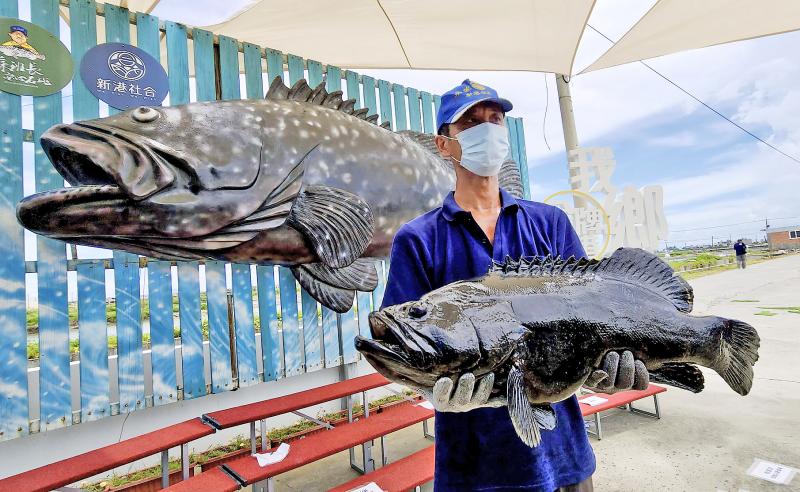The Council of Agriculture (COA) yesterday said it would budget more than NT800 million (US$26.92 million) to help Taiwanese fish farmers, after China this week implemented a ban on grouper imports from Taiwan.
The Chinese General Administration of Customs on Friday last week announced that it would suspend the imports from Monday, citing prohibited chemicals and excessive levels of oxytetracycline allegedly found in grouper imports since December last year.
The council yesterday said it would offer grouper farmers cash subsidies to promote their products in other Asian countries.

Photo: CNA
They would receive NT$40 per kilogram of grouper transported by ship and NT$75 per kilogram transported by plane, it said.
Exports to other places — including the US, Canada, the EU, New Zealand, Australia and the Middle East — would receive subsidies of NT$50 per kilogram transported by ship and NT$75 per kilogram transported by plane, the council added.
It also budgeted NT$40 million to initiate overseas promotion of Taiwanese grouper, the COA said.
The Fisheries Agency is setting aside NT$82.6 million to fund interest-free loans running up to one year, and would offer assistance and training for those interested in raising grouper, agency Deputy Director-General Lin Kuo-ping (林國平) said.
The program would run until May next year, Lin said.
The agency said it is also allotting NT$377 million for subsidies of NT$40 per kilogram of grouper that has been scaled, gilled and gutted, NT$40 per kilogram of grouper steaks or filets, and other expenditures for fish farmers working with online platforms, supermarkets, convenience stores and restaurants.
COA Minister Chen Chi-chung (陳吉仲) wrote on Facebook that Beijing wrongfully accused three farmers of producing allegedly tainted fish found on two ships.
The fish on those ships came from 11 separate farms, Chen said, adding that tests conducted there were negative for tetracycline, malachite green and crystal violet.
“This scientifically demonstrates that Taiwanese groupers are safe,” Chen said.
Chen said the council would provide the findings to its Chinese counterpart, urging it to provide proof of its claims.
China should abide by international law and uphold the global trade order, he said.
President Tsai Ing-wen (蔡英文) said China was “obstructing Taiwan’s freedom of trade.”
The government would stand with Taiwanese fish farmers, and continue to uphold and protect their rights, she said during a visit to fish processing plants and farms in Kaohsiung.
Additional reporting by Huang Hsu-lei

The Central Election Commission has amended election and recall regulations to require elected office candidates to provide proof that they have no Chinese citizenship, a Cabinet report said. The commission on Oct. 29 last year revised the Measures for the Permission of Family-based Residence, Long-term Residence and Settlement of People from the Mainland Area in the Taiwan Area (大陸地區人民在台灣地區依親居留長期居留或定居許可辦法), the Executive Yuan said in a report it submitted to the legislature for review. The revision requires Chinese citizens applying for permanent residency to submit notarial documents showing that they have lost their Chinese household record and have renounced — or have never

A magnitude 5.6 earthquake struck off the coast of Yilan County at 12:37pm today, with clear shaking felt across much of northern Taiwan. There were no immediate reports of damage. The epicenter of the quake was 16.9km east-southeast of Yilan County Hall offshore at a depth of 66.8km, Central Weather Administration (CWA) data showed. The maximum intensity registered at a 4 in Yilan County’s Nanao Township (南澳) on Taiwan’s seven-tier scale. Other parts of Yilan, as well as certain areas of Hualien County, Taipei, New Taipei City, Taoyuan, Hsinchu County, Taichung and Miaoli County, recorded intensities of 3. Residents of Yilan County and Taipei received

Taiwan has secured another breakthrough in fruit exports, with jujubes, dragon fruit and lychees approved for shipment to the EU, the Ministry of Agriculture said yesterday. The Animal and Plant Health Inspection Agency on Thursday received formal notification of the approval from the EU, the ministry said, adding that the decision was expected to expand Taiwanese fruit producers’ access to high-end European markets. Taiwan exported 126 tonnes of lychees last year, valued at US$1.48 million, with Japan accounting for 102 tonnes. Other export destinations included New Zealand, Hong Kong, the US and Australia, ministry data showed. Jujube exports totaled 103 tonnes, valued at

BIG SPENDERS: Foreign investors bought the most Taiwan equities since 2005, signaling confidence that an AI boom would continue to benefit chipmakers Taiwan Semiconductor Manufacturing Co’s (TSMC, 台積電) market capitalization swelled to US$2 trillion for the first time following a 4.25 percent rally in its American depositary receipts (ADR) overnight, putting the world’s biggest contract chipmaker sixth on the list of the world’s biggest companies by market capitalization, just behind Amazon.com Inc. The site CompaniesMarketcap.com ranked TSMC ahead of Saudi Aramco and Meta Platforms Inc. The Taiwanese company’s ADRs on Tuesday surged to US$385.75 on the New York Stock Exchange, as strong demand for artificial intelligence (AI) applications led to chip supply constraints and boost revenue growth to record-breaking levels. Each TSMC ADR represents